When Your Body Is Your Brand
For women whose livelihood is yoked to their physical self, the concept of wellness is highly complicated.
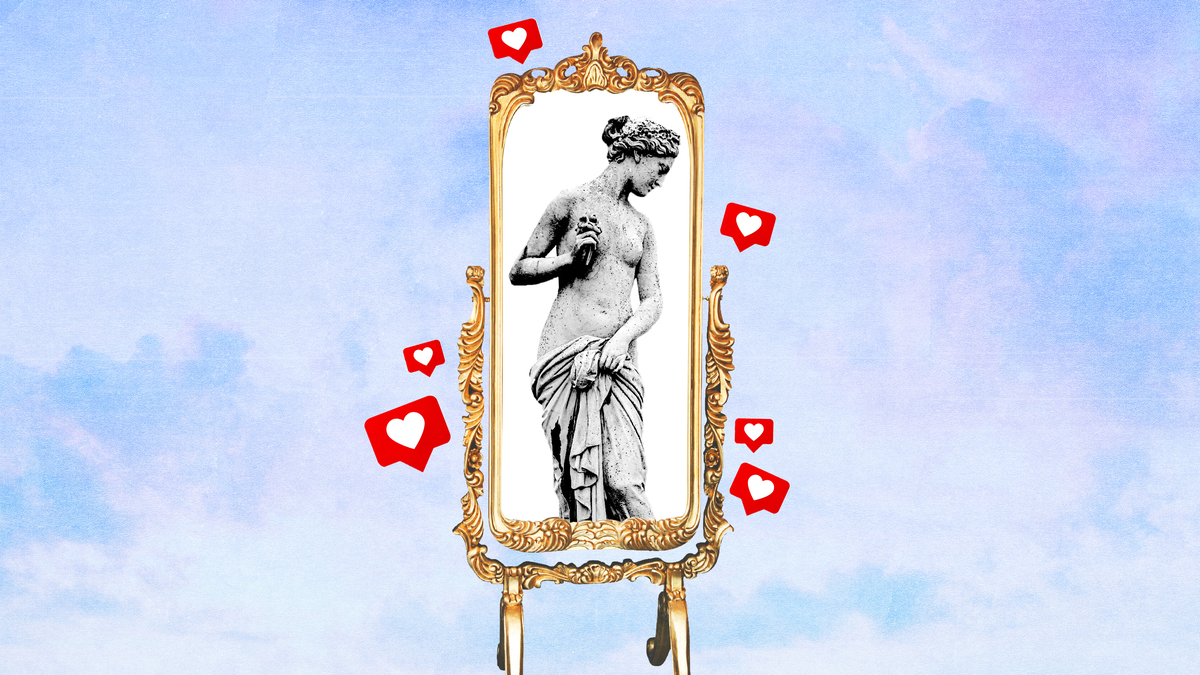

If there was a magic pill for achieving a perfectly healthy body (and body image) while simply enjoying life, everyone would be popping them like candy. Unfortunately, there’s not. So we turn to meditation apps, self love podcasts, and workout subscriptions. We search for clothes that make us feel good in our own skin and support businesses emphasizing inclusivity. We seek out content creators who seemingly have body image figured out, or wellness gurus with diet plans and fitness routines that promise results. We hit the follow button and become invested in these strangers' lives, because—consciously or subconsciously—we believe we can have that life too.
As we absentmindedly scroll through their content or impulsively hit the “add to cart” button on products they recommend, these people are working. They’re strategizing, negotiating, filming, and more. Their physical figure—whatever it may be—is attached to their income. Whether they’re benefitting from the TikTok Creator Fund (which reportedly pays two to four cents per 1,000 views) or using their platform as leverage for partnerships and proprietary brands, these individuals are profiting off of the wellness industry, which is projected to be worth nearly seven trillion dollars by 2025.
We spoke to three women whose appearances are directly tied to their profession. Through the public consumption of their body (and their habits and mindset around it), they’ve made an impact in their followers’ lives, prompted change in the fashion space, and shifted ways of thinking. But on the flip side, they’ve had to deal with trolls, struggled to find balance, and learned that it’s nearly impossible to make everyone happy. Here, they candidly share how they navigate the business world when their body is their brand.
On How One Size Will Never Fit All
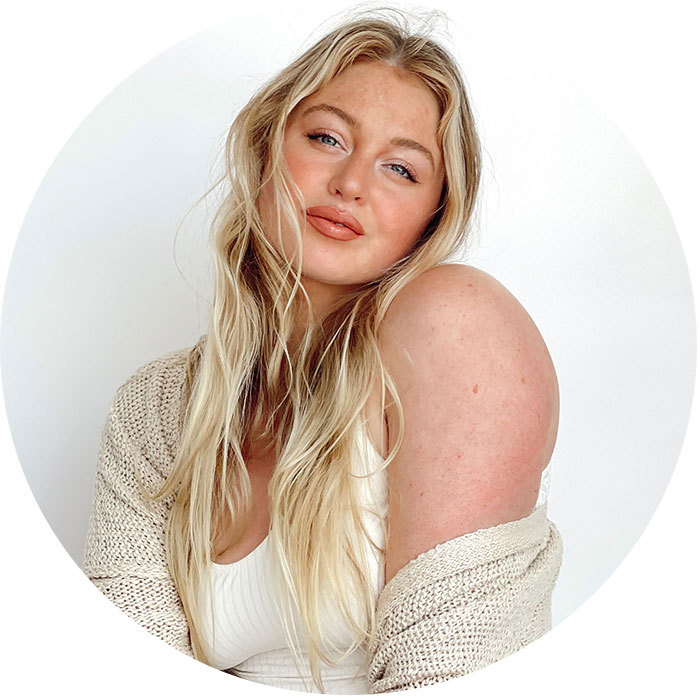
Iskra Lawrence, model, mom, and founder of body care brand Saltair, “accidentally” became a point of inspiration for her followers, 80 percent of whom are, like her, a size 12 to 14. As she’s grown her platform, Lawrence has come to learn that her online community expects her to look a certain way—a way that looks like them. While she has vowed to keep her content as real as possible (no retouching, no editing), she’s also come to accept that fans will come and go as she evolves.
“Imagine you're in a dress shop. People are coming in to visit the dress shop and they love all the dresses. Then one day, they come in and the shop is filled with shoes. The customers are like, ‘Wait, I always come here for my dresses. I don’t want shoes.’ That’s how my followers treat me when I gain a little weight or lose a little weight. Whenever I have a size shift, whether it’s from working out a little more or having a crazy period, it throws people off. They think: Iskra said she was really happy and confident at a size 12 and she was helping me feel confident at a size 12, but now she’s slimmer—or bigger—and I don’t know if I should believe her. It’s like we’re all running a marathon together and I’m the marker of success.
Any time I gain or lose weight, there are always comments. I know there are tougher things in life than someone calling out weight gain or weight loss—100 percent. But is it frustrating and annoying? Do I wish for better? It definitely impacts you when you know that there are millions of eyes on you.
Size is the first thing people notice. We have been sold that our appearance is our sense of worth and that if our appearance changes, something must be going on. Our gut instinct is to praise or criticize a change. We’re taught from day one that wellness is about size and appearance. You lose weight and people say, ‘congratulations.’ That outlook is even in the health and wellness system itself. When I was pregnant, I went to the doctor and the first thing they did was weigh me and tell me that my BMI was high. When this fat phobia intersects into our daily lives, it can be really tough.
Get exclusive access to fashion and beauty trends, hot-off-the-press celebrity news, and more.
It would be incredible if people could comment on something other than size and shape when they look at a body, but—and I don’t want to be negative—I don’t see that happening any time soon. We would need a total shift in society. We would need to teach, from a very young age, that size is not attached to health or self worth.
I can’t blame people though. I know how hard it was for me to get out of that mental space. I mean, it’s my whole career to have a healthy mindset. For people who have nine-to-fives that aren’t related to the way they look, it’s a challenge to find time. And it takes a lot of time, and work, and dedication, to change how you think and communicate about wellness. I have a weird empathy sometimes for trolls because it must suck to be stuck in a negative space.”
On How a Step Back Can Be a Step Forward
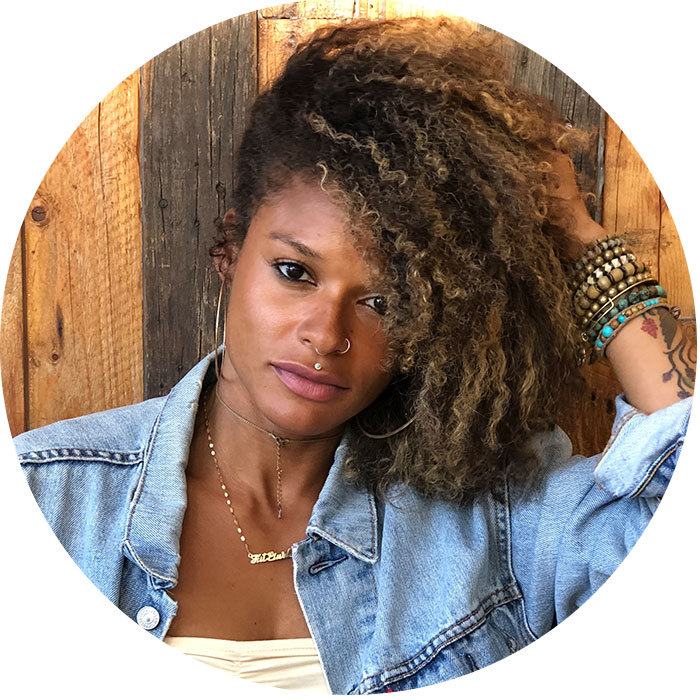
Melissa Alcantara, a.k.a. FitGurlMel, firmly believes in giving everything 100 percent at the get-go. For the past few years, she’s channeled all she has into fitness: bodybuilding, training Kim Kardashian, and documenting her workouts. Now, she’s letting go (just a little bit) to focus on the business side of things. She’s amped up content production on her FitGurlMel app, which first launched in January 2021, secured partnerships with brands like Gymshark and Gym Weed, and become more involved in the behind-the-scenes negotiations necessary for the growth of her brand.
“I’ve lived the majority of my life in extremes. It’s always been 100 percent or nothing. If I was lazy, I was 100 percent lazy. If I was on a diet, it was 100 percent. When I would serve coffee as a waitress in Brooklyn, I gave it my all. I didn’t do that for any other reason than to feel like I was giving everything I had. Since I started my fitness journey, I’ve been on a very strict macronutrient-guided diet and working out at almost 100 percent every day. I would literally get off a 16 hour plane from Australia and go straight to the gym. I wouldn’t even drop off my bags.
I always did these kinds of things for myself. I started bodybuilding when I knew absolutely nothing about it. I started learning how to use weights and got a coach. I won two categories in my first competition. When I posted a picture, Kim [Kardashian] found my photo and had her people reach out to see if I would train her. Kim is known for her body, so I knew this was going to be big for me. She saw a photo of this super ripped girl, but by the time I actually went to go meet her in person four weeks later, I had gained 25 pounds. That’s a repercussion of competing, but I didn’t know that at the time. I thought: Kim wants me to train her, but she didn’t meet me looking like this. I felt like I had let her down. That pressure was there, but eventually, my body regulated. When that happened, I had a new motivation. It was then all about me feeling good about myself, motivating people, and letting my followers know that they can do what they set their mind to.
After that, everything happened so fast. All of a sudden I was getting to work with Gymshark, and travel, and meet all these people. I never thought about my personal brand—I never had a thought-out strategy. I’ve always had people dealing with the business end, while I posted what felt natural and good and normal and honest. Over time, my business started to take priority. But I knew that if I was totally focused on eating right and working out, I couldn’t give attention to the day-to-day of my business, which was, ironically, my body.
For some time, I didn't think I could live in balance. It wasn’t easy; it took work. I had to really be conscious and say, ‘I'm not gonna work out six days a week.’ I’ve finally come to a point where I have more balance in my life. I’ll work out three or four times a week and I don’t even give 100 percent. I eat whatever I want, which is normally home-cooked food, but I’m not always eating wildly healthy. I drink alcohol. My body is always in flux and brands that choose to work with me are not expecting the Melissa from two years ago, or that body. They're more interested in who I am and why it is I choose to do things and the mindset behind it. Now, I’m able to be more involved in talking to brands, negotiating my contracts, all the backend stuff. The irony is people wouldn’t ever know the difference in the way I look. They see me now and still think, Oh my god, you have abs.”
On Confronting the “Body Positivity” Label
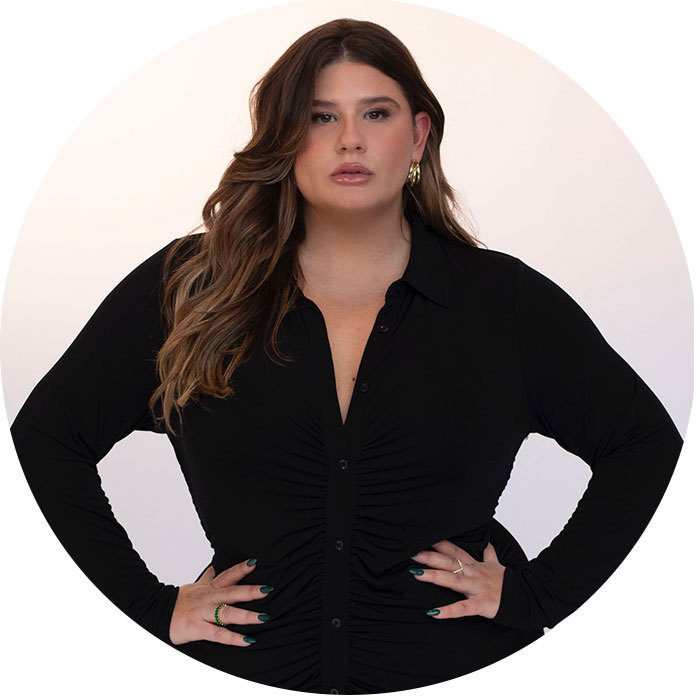
After being laid off from her music industry job at the onset of the pandemic, Remi Bader signed up for a little thing called TikTok. Fast forward through one viral “Realistic” try-on haul after the other, and the curve model became one of the most successful content creators on the platform, landing major deals with PINK as a size consultant and Revolve (her capsule collection launches August 10). But Bader doesn’t want her honesty to be mistaken for expertise or her candidness to equate to unabridged self love.
“Everyone very quickly started calling me ‘body positive Remi.’ I didn’t care; I was excited. But over time, I realized I didn’t want to be put inside this body positive box. I don’t feel body positive at the moment and I never want to be inauthentic. I’ve had people come to me and say, ‘Well, you are body positive. It doesn’t mean you need to love your body every day.’ But when I think about body positive content creators, it’s really those people that always show off their body and are able to love their body no matter how it looks—whether they stick out their stomach or are in a certain position. For me, I feel confident when I put on a nice outfit or get my hair and makeup done. That doesn't mean that I love every second of what’s going on underneath. It’s more of body neutrality. It’s accepting that this is me. I’m not going to hide in my room. I’m going to go live my life.
When I stopped going by ‘body positive Remi,’ it brought about some negativity. Some people would say, ‘Well, she says she’s not body positive so why are we looking up to her?’ That turned into people calling me fat phobic. Not feeling good in my body every single day isn’t body positive and it’s not fat phobic, it’s just me living life. People like to title things and I don’t think that’s necessary.
I started in this industry talking about my body, so I have to accept that my figure is always going to be tied to my brand. And I have to be okay with the positives and negatives that come with that. I just have to keep reminding myself that I am affecting people in a positive way. The fact that I’m working with Revolve and PINK, helping them with their sizing, and making clothes that are going to fit more bodies—there’s nothing better than that. Of course, I’ve gotten negative feedback for not being the biggest size or not doing enough to help [the curvy or plus-size community], but I’d rather be the smallest, tiniest part of change in the fashion industry than doing nothing at all.
Most of my followers have been on my journey with me. They know my struggles and they’re happy if I’m happy. There’s always this lingering question: If you lost weight would it affect your brand. First of all, I’m never going to be a size zero. It’s not in the cards for me, but if I were to automatically lose 100 pounds, maybe I’d lose some followers. Maybe I’d gain some more? I try to not let that thought affect me. I’m just trying mentally to be a little more accepting of my current body.
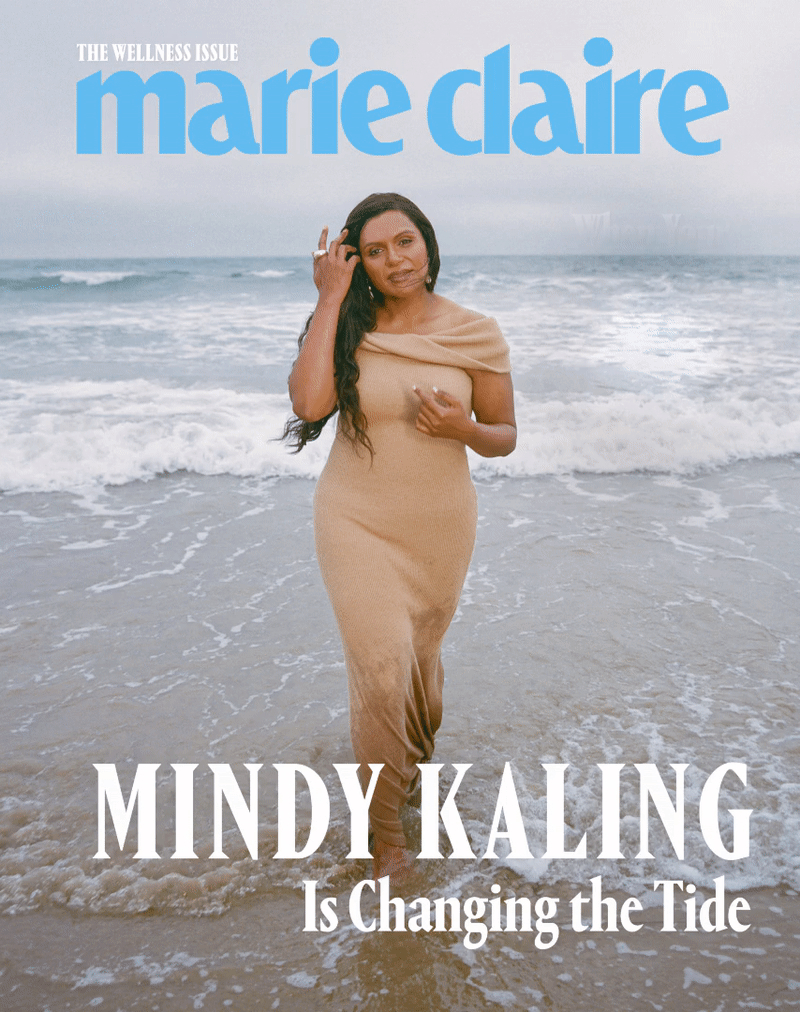
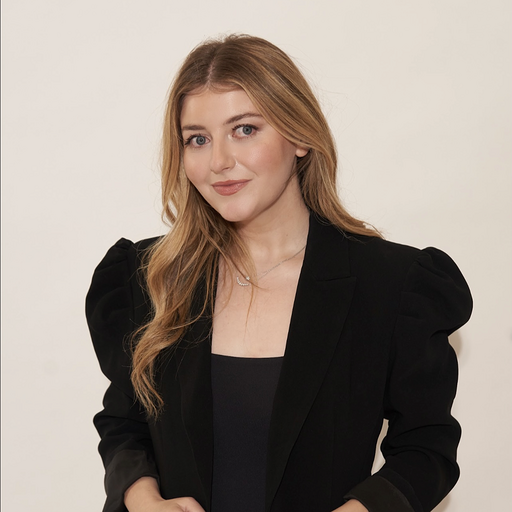
Samantha Holender is the Senior Beauty Editor at Marie Claire, where she reports on the best new launches, dives into the science behind skincare, and shares the breakdown on the latest and greatest trends in the beauty space. She's studied up on every ingredient you'll find on INCI list and is constantly in search of the world's glowiest makeup products. She's constantly tracking the biggest nail and hair trends to pop up in the beauty space, going backstage during fashion weeks, tracking celebrity looks, and constantly talking to celebrity hair stylists, nail artists, and makeup artists. Prior to joining the team, she worked as Us Weekly’s Beauty and Style Editor, where she stayed on the pulse of pop culture and broke down celebrity beauty routines, hair transformations, and red carpet looks. Her words have also appeared on Popsugar, Makeup.com, Skincare.com, Delish.com, and Philadelphia Wedding. Samantha also serves as a board member for the American Society of Magazine Editors (ASME). She first joined the organization in 2018, when she worked as an editorial intern at Food Network Magazine and Pioneer Woman Magazine. Samantha has a degree in Journalism and Mass Communications from The George Washington University’s School of Media and Public Affairs. While at GWU, she was a founding member of the school’s HerCampus chapter and served as its President for four years. When she’s not deep in the beauty closet or swatching eyeshadows, you can find her obsessing over Real Housewives and all things Bravo. Keep up with her on Instagram @samholender.